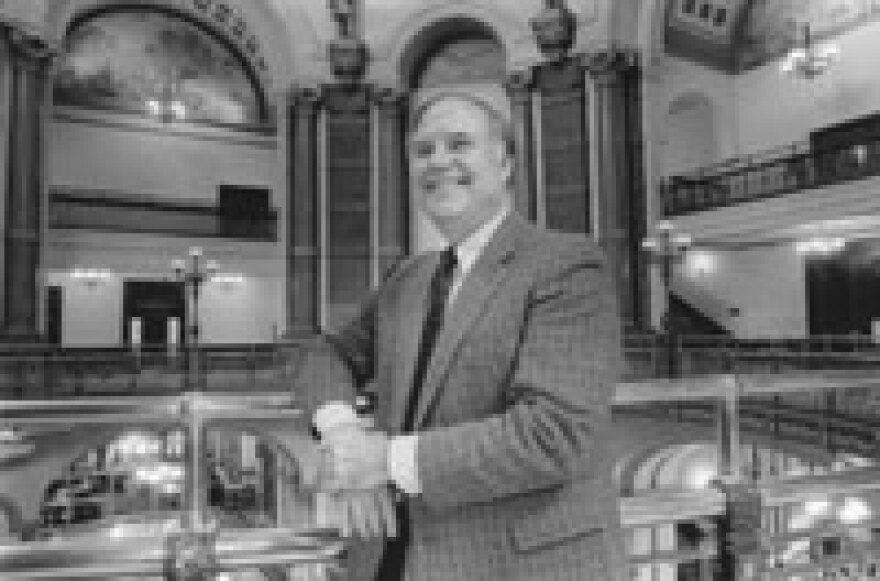If ominous winds are sending chills up and down the spines of the muckety-mucks frequenting the 16th floor of the James R. Thompson Center and the 5th floor of Chicago's City Hall, don't blame vagrant breezes off Lake Michigan.
Instead, look south a few blocks to the Dirksen Federal Building, where a few weeks ago a federal jury found former Gov. George Ryan and Chicago businessman Larry Warner guilty on all counts in a marathon public corruption trial.
One day after Easter, the six-woman, six-man panel convicted Ryan of 18 counts of racketeering conspiracy, mail fraud, making false statements to investigators and tax fraud. Jurors nailed Warner, a Ryan friend, on 12 counts of racketeering conspiracy, mail fraud, extortion and money laundering.
Minutes after the verdict was announced, the former governor said he was "disappointed" and planned to appeal. "I believe this decision today is not in accordance with the kind of public service I've provided to the people of Illinois over the years," Ryan said.
Discussing an appeal, Dan Webb, a former U.S. attorney who headed Ryan's defense team, noted the "unusual circumstances" around the decision by U.S. District Judge Rebecca R. Pallmeyer to dismiss two jurors who had lied about previous arrests after eight days of deliberation. The judge replaced the pair with alternates and instructed the reconstituted panel to start over — a task the defense said was virtually impossible.
But the new jury announced its verdict on its 11th day of deliberations, capping a seven-month trial during which federal prosecutors portrayed Ryan as a corrupt official who, as secretary of state and governor, betrayed the public trust to enrich Warner and other friends in return for cash and other gifts for himself and for his family.
With the Ryan case under their belts, the high-powered federal team of prosecutors and investigators now can concentrate on a number of ongoing probes targeting the state and the city.
Throughout the trial, Ryan's attorneys stressed that not one witness testified that he saw Ryan take a bribe, while Warner's lawyers contended that he was a businessman whose supposed offenses were simply the way politics has been conducted in Illinois since statehood.
Neither argument persuaded jurors to acquit on even a single count, though, leading to a couple of significant conclusions that should terrify ethically challenged politicians:
• Even without direct eyewitness testimony, an overwhelming amount of circumstantial evidence in a political corruption case can convince jurors beyond a reasonable doubt that a crime has been committed.
"There was no smoking gun in this case," Assistant U.S. Attorney Patrick Collins, the lead prosecutor, told reporters. "This case was tried witness by witness, piece of evidence by piece of evidence, and it was only by looking at the totality of the case that the true picture could be shown to this jury. And that was a picture of corruption of the highest levels of government."
• Jurors are willing to find that a spoils system of rewarding family and friends with jobs and contracts is a federal crime, even if it does embody the state's traditional political culture.
"If they keep stealing, there will still be agents chasing them and prosecutors going after them," U.S. Attorney Patrick Fitzgerald said. "Hopefully at some point somebody realizes it's in the best interest not to do it. I think that we'll just have to keep doing our jobs and hope that we run out of business at some point."
That point doesn't appear anywhere near, however, which may help explain any goose bumps found among Gov. Rod Blagojevich's palace guard or in Chicago Mayor Richard Daley's inner circle.
With the Ryan case under their belts, the high-powered federal team of prosecutors and investigators now can concentrate on a number of ongoing probes targeting the state and the city.
For example, federal, state and local gumshoes are scrutinizing Blagojevich's employment and contracting practices, in the wake of numerous "pay to play" allegations, including one — later recanted — from Chicago Alderman Richard Mell, the governor's father-in-law.
In addition, federal grand juries have subpoenaed hiring records from at least three state agencies and the governor's office, and inquiries also are under way into contract awards for services as diverse as lottery advertising and power-washing state buildings.
Moreover, a little more than two weeks before the Ryan verdict, Auditor General William Holland said he was sending state and federal investigators audit findings revealing some $700,000 in questionable spending by state transportation officials. Holland routinely dings Blagojevich's agencies for mismanagement, inefficiency and plain sloppy record-keeping, but in only a handful of cases have auditors uncovered what they believe might be criminal violations.
Patronage and kickbacks at Daley's City Hall also appear on the feds' radar.
Former City Clerk James Laski pleaded guilty to bribery in March as part of an ongoing investigation into corruption in the city's Hired Truck program.
Meanwhile, Robert Sorich, the mayor's former patronage chief, is awaiting trial later this month on mail fraud related to hiring practices. In a 91-page court document filed last month, prosecutors accused Sorich of ordering his secretary to delete computer files and shred paper files with data about political hiring.
Will continued federal heat finally melt what seems to be Illinoisans' long-standing tolerance for political knavery? Prosecutor Collins has the final word: "Unless and until the state, city and county learn there are victims of corruption, there are tangible consequences of corruption, [and] unless and until people who vote understand that there are important consequences in their public officials' acts of dishonesty, this system will not change."
Charles N. Wheeler III is director of the Public Affairs Reporting program at the University of Illinois at Springfield.
Illinois Issues, May 2006






